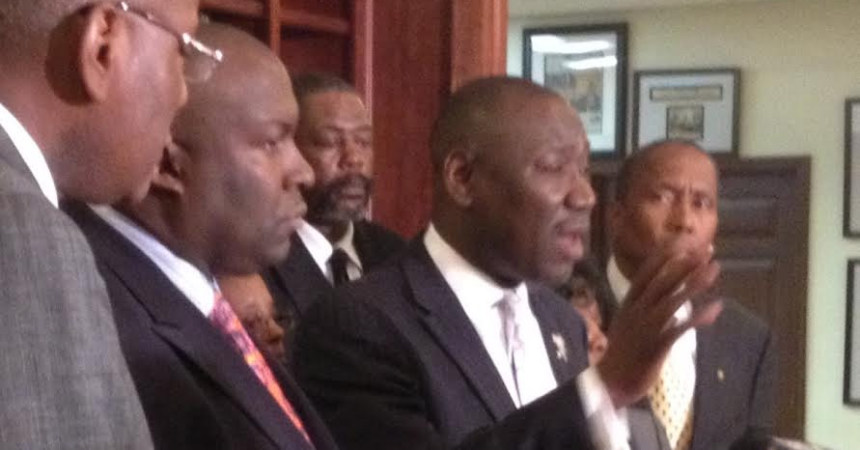
Dawson’s death raises ‘anti-dumping’ concerns

Flanked by members of Barbara Dawson’s family, attorney Benjamin Crump outlined details of the video
leading up to her death.
Photo by St. Clair Murraine
By St. Clair Murraine
Outlook staff writer
The evidence couldn’t be clearer than the audio from a video released by lawyers representing Barbara Dawson’s family.
From the recording of her final hours alive, Dawson could be heard pleading for help several times before she collapsed and died minutes after being removed from Liberty Calhoun County Hospital in handcuffs.
But even clearer, contend attorneys from the Parks and Crump firm, which is representing Dawson’s family, is violation of a federal law known as the Emergency Medical Treatment and Labor Act. Congress passed the law in 1986 after countless reports of hospitals across the country turning away patients that didn’t have insurance or money to pay.
EMTALA makes it mandatory that hospitals attend emergency room patients regardless of their ability to pay for treatment. It became known as patients’ “anti-dumping” law.
While it hasn’t been clear why Dawson was turned away on Dec. 21, her case is a classic example of an EMTALA violation, said attorney Benjamin Crump.
“This is what the United State Congress was dealing with,” Crump said. “This is not just an issue that affects Blountstown, but this is an issue that’s germane to all of America.
“This paints a picture of anti-dumping. It puts it in vivid color what the United State Congress was trying to deal with.”
Dawson went to the Liberty Calhoun Hospital complaining of difficulty breathing on Dec. 21. However, she was discharged and later forcibly removed from the hospital by police and later died in the hospital parking lot.
Because of the possible violation of the EMTALA law, attorney Daryl Parks suggested that the FBI could get involved in the investigation, along with Florida Department of Law Enforcement.
Up until she collapsed outside a police car in the hospital parking lot, Dawson pleaded with the arresting officer to let her get treatment for problems she had breathing.
“Oh, my God,” Dawson could he heard saying early on the video.
Later on, as she continued to ask for medical assistance while the officer insisted that she leave the hospital, Dawson was heard saying, “help me. I can’t breathe.”
When she fell, the officer could be heard telling Dawson, “This is not going to keep you from going to jail tonight.”
A nurse later begged Dawson to get up, telling her “There is nothing wrong with you.”
“Something is wrong here,” said State Rep. Darryl Rouson, D-St. Petersburg, who is assisting with the case. “We think what they did was put criminality over healthcare. What they did here was compromise public safety by failing to give her the medical attention that she deserved and that she needed.”
Dawson, whose autopsy showed that she died of a blood clot in her lungs, was left with the arresting officer for at least 20 minutes without getting medical assistance from a doctor.
“We believe from a medical standpoint and the police’s standpoint that is significant,” said Parks.
Most of what the attorneys heard and saw on the video contradicts prior statements that Dawson was being helped rapidly, Parks said.
“We are very troubled,” he said. “Barbara Dawson shouldn’t have lost her life because of a bad assumption by either a law enforcement officer or by hospital personnel.”
Both the Blountstown Police Department and hospital issued statements in response immediately after the release of the video to a throng of media last week.
“Our primary objective in this situation is to remain transparent and to welcome investigation from authorities,” said Calhoun Liberty Hospital’s CEO Ruth Attaway in a statement. “We have already welcomed reviews and investigations from the Agency for Health Care Administration and the Florida Department of Law Enforcement as well as the Department of Health.
“To the fullest extent permitted by state and federal law, we will continue to be transparent and forthcoming with our community and the public.”
In a release, the BPD said the arresting officer followed procedure when he removed Dawson from the hospital.
“In Ms. Dawson’s case, the responding officer acted appropriately, by requesting immediate assistance from medical professionals,” the statement read. “As clearly depicted in the audio recording of the events as they transpired on December 21, 2015, the officer sought medical attention for Ms. Dawson within less than one minute of her collapse.
“The medical professionals that responded to Ms. Dawson in the Calhoun-Liberty Hospital parking lot included the following: registered nurses, a paramedic and a doctor.”
Several of Dawson’s relatives stood with teary eyes while attorneys talked with the media. They later viewed the video at the attorneys’ office.
“We cannot bring Barbara back,” said Martha Smith, one of Dawson’s relatives. “No one can bring her back. Therefore, we want justice for Barbara so this will not happen to anyone else.”
Rev. R.B. Holmes, president of the local chapter of the National Action Network, viewed the video with the family. It was very emotional, Holmes said.
“I hope that due process will be served,” Holmes said. “We’ve got the trust and the verifier. I think this is the beginning of hopefully letting the community know what’s really going on. We will continue to support the family in this ordeal.”







